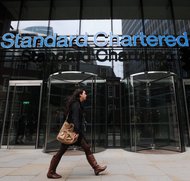 The British bank Standard Chartered reached a deal with federal and state prosecutors on Monday over accusations that it had illegally funneled money for Iranian banks and corporations.
The British bank Standard Chartered reached a deal with federal and state prosecutors on Monday over accusations that it had illegally funneled money for Iranian banks and corporations.The 150-year-old bank will pay $327 million to settle claims by the Justice Department, the Manhattan district attorney�s office, the Federal Reserve Bank of New York and the Treasury Department.
�Investigations of financial institutions, businesses and individuals who violate U.S. sanctions by misusing banks in New York are vitally important to national security and the integrity of our banking system,� Cyrus R. Vance Jr., the Manhattan district attorney, said in a statement.
The agreement allows the bank to move beyond a turbulent period.
In August, the New York State Department of Financial Services, headed by Benjamin M. Lawsky, broke from regulators and moved to accuse Standard Chartered of scheming for nearly a decade to hide 60,000 transactions worth $250 billion. Standard Chartered agreed to pay $340 million over the matter a month later.
United States authorities have been cracking down on banks that flouted federal law to transfer money on behalf of sanctioned nations. Investigations into Standard Chartered began in 2009, according to several law enforcement officials.
Executives at Standard Chartered have spent months trying to work out a settlement and resolve the investigation. Lawyers for the bank, in numerous conversations with federal and state prosecutors, maintained vociferously that a large majority of the transactions with Iran were permitted under a federal law that previously allowed foreign banks to transfer money for Iranian clients to another foreign institution through their American subsidiaries.
The settlement will also help to quell tensions between the law enforcement agencies, which were riven by divisions after Mr. Lawsky moved independently against the bank.
Since January 2009, the Justice Department, Treasury and the Manhattan prosecutor have charged five foreign banks in an effort to crack down on the illegal movement of tainted money across the globe. In June, ING Bank reached a $619 million settlement to resolve claims that it had transferred billions of dollars in the United States for Cuba and Iran.
As part of Monday�s agreement, Standard Chartered admitted to processing more than $200 million for Iranian and Sudanese clients through its American subsidiaries. To avoid those transactions getting snagged in Treasury filters to stop payments to sanctioned nations, Standard Chartered deliberately removed identifying information, according to authorities.
Until 2008, foreign banks like Standard Chartered were permitted to transfer money for Iranian clients through their American branches to separate offshore institutions. These so-called U-turn transactions required banks to provide scant information about the original client to their American operations as long as they had checked for questionable activities. The Iranian loophole was closed in 2008 after American authorities suspected that Iranian banks were funneling money to support nuclear weapons development.
While the overwhelming majority of payments processed by Standard Chartered for Iran and Sudan were technically legal, they should have been disclosed, the Manhattan District Attorney said Monday. Mr. Lawsky had based his case against Standard Chartered, for a large part, on similar claims that the bank thwarted efforts to spot sanctions violations by cloaking the identities of Iranian clients and lying to regulators.
??By The New York Times
The Iran Project is not responsible for the content of quoted articles.











